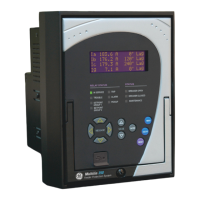2-2 SR3 SERIES PROTECTIVE RELAY PLATFORM – COMMUNICATIONS GUIDE
MODBUS PROTOCOL CHAPTER 2: RS485 INTERFACE
MODBUS Protocol
The 3 Series relay implements a subset of the Modicon Modbus RTU serial communication
standard. The Modbus protocol is hardware-independent. That is, the physical layer can be
any of a variety of standard hardware configurations. This includes USB, RS485, fibre
optics, etc. Modbus is a single master / multiple slave type of protocol suitable for a multi-
drop configuration.
The 3 Series relay is always a Modbus slave. It can not be programmed as a Modbus
master. Computers or PLCs are commonly programmed as masters.
Both monitoring and control are possible using read and write register commands. Other
commands are supported to provide additional functions.
The Modbus protocol has the following characteristics.
•Address: 1 to 254
• Supported Modbus function codes: 1H, 2H, 3H, 4H, 5H, 6H, 7H, 8H, 10H, 42H, 43H
For details see MODBUS Functions.
Data Frame Format and Data Rate
One data frame of an asynchronous transmission to or from a 3 Series relay typically
consists of 1 start bit, 8 data bits, and 1 stop bit. This produces a 10 bit data frame. This is
important for transmission through modems at high bit rates.
Modbus protocol can be implemented at any standard communication speed. The 3 Series
relay
supports operation at 9600, 19200, 38400, 57600, and 115200 baud.
NOTE:
The USB interface will support only 115200 baud.
Data Packet Format
A complete request/response sequence consists of the following bytes (transmitted as
separate data frames):
Master Request Transmission:
SLAVE ADDRESS: 1 byte
FUNCTION CODE: 1 byte
DATA: variable number of bytes depending on FUNCTION CODE
CRC: 2 bytes
Slave Response Transmission:
SLAVE ADDRESS: 1 byte
FUNCTION CODE: 1 byte
DATA: variable number of bytes depending on FUNCTION CODE
CRC: 2 bytes
SLAVE ADDRESS: This is the first byte of every transmission. This byte represents the user-
assigned address of the slave device that is to receive the message sent by the master.
Each slave device must be assigned a unique address and only the addressed slave will
respond to a transmission that starts with its address. In a master request transmission the
SLAVE ADDRESS represents the address of the slave to which the request is being sent. In a
slave response transmission the SLAVE ADDRESS represents the address of the slave that is
sending the response.
FUNCTION CODE: This is the second byte of every transmission. Modbus defines function
codes of 1 to 127.

